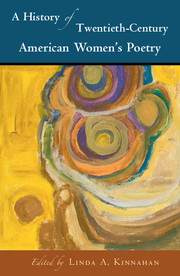Book contents
- Frontmatter
- Contents
- List of figures
- List of contributors
- Preface
- Acknowledgments
- PART I MAPPINGS AND CHRONOLOGIES
- PART II ETHNICITY, RACE, AND IDENTITY
- PART III MATERIAL FORMATIONS
- PART IV LINEAGES, TIES, AND CONNECTIONS
- PART V FORM, LANGUAGE, AND TEXT
- 19 Forgiving the Sonnet: Modernist Women's Love Poetry and the Problem of Sentimentality
- 20 The “do it yourself” Avant-Garde: American Women Poets and Experiment
- 21 Visual Poetics
- 22 Poetry and Technology
- PART VI CODA
- Bibliography
- Index
19 - Forgiving the Sonnet: Modernist Women's Love Poetry and the Problem of Sentimentality
from PART V - FORM, LANGUAGE, AND TEXT
Published online by Cambridge University Press: 05 June 2016
- Frontmatter
- Contents
- List of figures
- List of contributors
- Preface
- Acknowledgments
- PART I MAPPINGS AND CHRONOLOGIES
- PART II ETHNICITY, RACE, AND IDENTITY
- PART III MATERIAL FORMATIONS
- PART IV LINEAGES, TIES, AND CONNECTIONS
- PART V FORM, LANGUAGE, AND TEXT
- 19 Forgiving the Sonnet: Modernist Women's Love Poetry and the Problem of Sentimentality
- 20 The “do it yourself” Avant-Garde: American Women Poets and Experiment
- 21 Visual Poetics
- 22 Poetry and Technology
- PART VI CODA
- Bibliography
- Index
Summary
In 1924, Robertus Love, a St. Louis poet and newspaperman, sent the sonnet “For Edna St. Vincent Millay” to the poet in honor of her achievement with the form. Millay had recently published three critically acclaimed books of poetry in rapid succession: A Few Figs from Thistles, Second April, and The Harp-Weaver and Other Poems, for which she had been awarded the Pulitzer Prize. She had also just embarked on her first nation-wide reading tour. From 1924 to 1925, Millay visited twenty cities – from Charleston, West Virginia, to Cheyenne, Wyoming – and gave more than thirty poetry readings. Enchanted audience members, like Love, frequently wrote sonnets in response to her performances. Love begins by asking, “Who says a woman cannot wield the Sonnet?” and goes on to claim,
Shakespeare's chapeau is now become a bonnet,
And feather's flaunt from Petrarch's rim of bay;
Our Milton's name is altered to Millay;
Old Tasso's envious now—my word upon it!
The poem captures the new spirit of gender and sexual equality that took hold in American poetry in the wake of women's suffrage and the aftermath of World War I. In the late teens and early twenties, a new generation of white women poets came to dominate the American poetry scene. Millay was the widely acknowledged leader of this loose group, which also included Louise Bogan, Genevieve Taggard, Sara Teasdale, and Elinor Wylie, among other poets whose names are now less familiar. They inspired not only fan poetry like Love's but also some of the most important feminist poems of the era. Thanks in large part to the success of Teasdale's Love Songs, intricately crafted, formal love poems written by women for women became one of the modernist era's dominant poetic trends.
In 1918, Love Songs was awarded the Columbia Prize for Poetry, despite strong competition from more than five hundred books, including T.S. Eliot's Prufrock and Other Observations, H.D.'s Sea Garden, Ezra Pound's Lustra, and William Carlos Williams's Al Que Quiere!, all of which were eligible for the 1917 prize and all now considered to be defining modernist works. When the popular and formally conventional Love Songs was chosen from among this innovative field, it sparked critical controversy. In Poetry magazine, Harriet Monroe went so far as to question the credibility of the judges.
- Type
- Chapter
- Information
- A History of Twentieth-Century American Women's Poetry , pp. 307 - 322Publisher: Cambridge University PressPrint publication year: 2016



